THE BOWLING CLUB
The introduction of indoor bowling as an
opportunity of fellowship was largely due to Sam Patterson, who was
a keen outdoor bowler. He had heard that there were indoor bowling
clubs in a few Belfast churches. He approached a number of men whom
he thought would be interested in paying an exploratory visit to one
of these clubs. Arrangements were made to visit Cregagh Methodist
Club in the late Spring of 1953. Those who went were so enamoured
with the game and the obvious fellowship it created that it was
almost decided there and then to commence a club. At that time there
was no club outside Belfast, Banbridge Road Club has always claimed
to be the first provincial club. As a result of their visit a
meeting was held on the 29th June 1953 with a view to starting a
club. It was decided after some discussion to form a club under the
title, "The Banbridge Road Presbyterian Church (Dromore) Men's
Fellowship and Indoor Bowling Club." The Rev. Moore was elected
chairman, with James McCormick as President and Vice-Presidents S.
R. Patterson, S. J. Duffy and W. J. Thompson. The treasurer was Sam
Martin, and James Walker Secretary. A small committee met early in
September to arrange for the purchase of felt and baize and it was
decided to open the Club on the 28th September. The Bowling Club was
declared open and the first wood delivered by James McCormick. In
the coming months a number of men from other congregations in the
town and district applied for membership and were welcomed. Within a
few months there was a membership of 50. This in spite of the fact
that there were only two mats and a very bad surface on the floor�a
bowl, if it hit a groove or a raised knot, could go almost anywhere!
Enthusiasm made up for the long wait for a game and the difficulty
of play on the uneven floor.
The Club was so successful that it commended
indoor bowling to other congregations and soon new clubs were
springing up all over the province. With three clubs starting in the
town and clubs in a number of congregations in the area, membership
in the mother club suffered and new members had to be recruited. A
ladies' Club was started and was successful, for a number of years.
Then, following the example of some other clubs, it was decided to
have a mixed club. A feature of bowling life was the opportunity for
friendship and fellowship it created. Clubs visiting each other
brought about new and enriching friendships.
Inevitably competitive bowling became popular,
first within the club and then in tournaments. A tournament was held
each year and a large entry from other clubs was a feature. This
became the pattern for most clubs and there were those who felt that
so many members were so much engaged in tournament bowling that the
local club suffered. This of course was true; however the
enthusiasts loved the opportunites to compete and many of the
Banbridge Road members brought considerable credit to themselves and
their club.
The Rev. Moore always made a point of being
present when there was a visiting club. He conducted a short service
of worship, and gave a word of welcome to the visitors. The members
and the visitors looked upon this as a feature of the Banbridge Road
Club.
The Bowling Clubs were fortunate in their
office-bearers�Jim Walker was secretary for some 17 years, and his
sister-in-law, Miss Jean Watson, has been secretary for a similar
period. Earl McCracken was secretary for a short time between these,
but had to resign for health reasons. Mrs. Loretta Aiken has been a
valuable assistant secretary for some years. The first treasurer was
Sam Martin, who died a young man. He was succeeded by Sam Thompson
of the Northern Bank; who remained in office until he left the
district on retirement from the bank. For a short period Norman
Hubbard undertook this work. On his leaving the town Mrs. Madge
Johnston was appointed; after seven years it passed to David
McCandless, who took the responsibility for the next seven years. At
present the treasurer is Sam Malcolmson. The various committees were
always supportive and at present the club looks healthy and well set
for the years ahead.
On the 10th anniversary of the founding of the
club there was a special service to mark the occasion. The address
was given by Prof. J. M. Barcley, M.A., PhD., D.D., and again on the
completion of 21 years Prof. Barcley, who had been a popular
preacher on the first occasion, was invited back to give the
address.

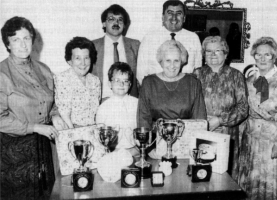
Front row:
Loretta Aiken, Jean Watson, Alan Malcomson,
Mrs. M. Stewart, Mrs. D. Reain, Mrs. M.
Dewart. Back row: Rodney Malcomson, Kenneth
Aiken. End of 1988 season (Prize winners)
INDOOR BOWLING � OUT!!
Bowling was so popular with many members of the
club, there were some who suggested that it might be a good idea to
take the mats out to the car park and bowl in the open air during
the summer evenings. This was tried, but proved unsuccessful. The
surface of the tarmacadam was unsuitable, besides the bowls were
damaged when they went off the mat on to the abrasive surface. The
idea was good, but how? Later it was decided to lay special concrete
`bowling bays' as they came to be called. Jim Cargin set the levels,
concrete was ordered and two bays were laid, then a third. The
inscription on the concrete bears the names of those who did the
work: J. Hodgen, B. Rogan, J. Calder and the Rev. Moore. These bays
were laid behind the Minor Hall and when properly finished proved
very attractive. When the bowling community heard about the
innovation many came to see and to try them out. Thus the summer
club was formed which had amongst its members many bowlers whose
indoor clubs closed for the summer months. It was a great
opportunity for members of other clubs to have fellowship. Soon a
summer tournament was introduced. The first rounds were played in
the open air and the finals
in the hall. Light often stopped outdoor play,
sometimes the midges had the same result! The outdoor club commenced
in May 1966 and it continued for 20 years. Part of the reason for
the closure was the opening of a full length bowling green at Holm
Terrace. Many will look back on those twenty summers with happy
memories. They were pleasant evenings.
In the early days of the Bowling Club there were
those who carried the responsibility and promoted the interests of
the Club. It would be generally agreed that S. R. Patterson, James
Walker and James Mulligan were such. Harry Maisey was a key member
at a later date. More recently the Club has been kept enthusiastic
by members such as Kenneth and Loretta Aiken and Miss Jean Watson.
It was always a Club in which the members pulled their weight,
supporting those who gave leadership.
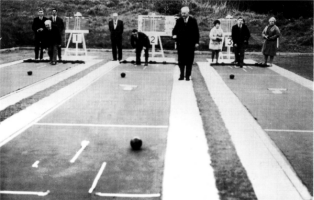
In the Summer
Indoor Bowling on the outdoor bowling bays.
In the forefront is Robert Rogan a bowling
stalwart

THE, SATURDAY EVENING YOUTH CLUB
The club was formed in 1973 at the request of a
number of young people who wanted somewhere to go and something to
do on a Saturday evening. There was some hesitation as such clubs
were notoriously hard to run and had proved difficult in other
congregations. However, the club started with enthusiasm. The minor
hall was used for reading and small games, the main hall for more
robust games. The numbers who came proved the need and there was a
helpful spirit of co-operation from the young people who in those
days were in the later teens.
Clifford Thompson had the main responsibility.
After a couple of years the club was reorganised and Miss Margaret
Coulter took over the leadership. Again the numbers were high and
the young people in their later teens. It was very difficult to
manage and keep the interest of the large number who came. However,
it can be said that it was successful and most found the club an
interesting place to go.
What might be called the Third Club was organised
by Jewel and Avril and Trevor Carson. While there were games nights,
and social meetings and Inter Church competitions it had also a
meeting format and speakers and films played a big part.
The Club was then taken over by Olive Wilkinson
and John Irvine. (Later to marry). The club was becoming better
equipped all the time. And when the next autumn came round John and
Olive had an abundance of good quality equipment and the average
member had become much younger. For a number of years the young
people and some of their leaders from First Dromore Sunday Evening
Fellowship joined and helped in the activities, and the young people
from Banbridge Road reciprocated by supporting the Sunday Evening
Youth Fellowship in First Dromore.
Those associated with the vicissitudes of the
Saturday evening youth clubs must feel sad that at present there is
so much good equipment lying unused and Cups and Trophies unplayed
for. However, it is hoped it may be resurrected a fifth time and be
of value to the next generation. The Club survived its ups and downs
because of the determination of the various leaders who gave much
time and preparation. Their work was never fully appreciated. A
number of the elders and committee members gave time too, acting as
`policemen' in a helpful and friendly way.

On a number of occasions apart from the reception
when they were married and when they retired the Rev. and Mrs. Moore
were honoured by the members of the congregation. After the
renovation of the church they received gold watches and other gifts
to mark the occasion. When Mr. Moore was 25 years in Banbridge Road,
it was celebrated with a 25th Anniversary Presentation. The chairman
on this occasion was the Clerk of Presbytery, the Rev W. L. McCombe,
the Moderator of Presbytery, the Rev. James Johnston, conducting the
Devotions. A feature of the evening was an interview with the
minister by the Clerk of Session, Mr. S. R. Patterson; in the course
of which he asked questions covering every aspect of Mr. Moore's
ministry. Finally, he asked Mr. Moore would he like to visit the
Holy Land; on Mr. Moore answering `yes', Mr. Patteson handed him
vouchers for a two week tour.
The visit to the Holy Land was such a valuable
experience that Mr. Moore decided to organise a party from Dromore.
This in turn proved so successful, that he not only returned to the
Holy Land on two other occasions but also took parties for a tour of
the Seven Churches of Asia Minor and later to Greec in the footsteps
of Paul.
This led to a number of group holidays being
arranged for the members of the congregation and their friends.
On two occasions the congregation presented Mr.
Moore with robes. The farewell reception was recorded on video and
is a visual record of a sad yet happy function.
On five occasions Mr. Moore exchanged pulpits
with Presbyterian ministers from the United States of America. These
proved to be of value to him and of considerable interest to the
congregation. The American ministers lived in the manse, used Mr.
Moore's car and conducted the services on the Sundays, Mr. Moore
doing the same in the States. There was a wide variety of exchanges,
and each of the ministers who came made his own contribution to the
Sunday worship. The congregation received the visitors with a warm
Irish welcome and always tried to make their stay a pleasant one.
Some had their family with them and happy friendships were formed.
THE FORTIETH ANNIVERSARY
OF THE
REV. MOORE'S ORDINATION
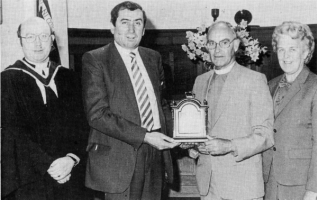
Banbridge Road Presbyterian Church
presentation to Rev. Moore to celebrate the
Fortieth Anniversary of his Ordination. From
left: Rev. Boyd Minister, Mr. K. Aiken � member
of session, Rev. Moore � Senior Minister and
Mrs. Moore.
Eighteen months after Mr. Moore retired he
celebrated the fortieth anniversary of his ordination. The
congregation marked the occasion with a presentation which took
place after the morning service on Sunday, 27th April, 1986.
The Rev. A. Boyd, his successor, introduced the
presentation and asked the treasurer, Mr. Kenneth Aiken, to hand
over the gift of a chiming mantel clock. Mr. Aiken referred to the
many changes which had taken place during Mr. Moore's forty years in
Banbridge Road � its buildings and a doubled membership. He said,
"Mr. Moore you have served your Master and His people well and as a
congregation we wish you and Mrs. Moore God's Blessing in the years
that lie ahead". Mr. Moore, in his reply, said that while there had
been many changes in the town and congregation, he thought, not so
much of them, as of the unchanging goodness and kindness he had
experienced from the people of Banbridge Road. He expressed his good
wishes to his successor for his work in the congregation.

The Rev. A. W. Boyd � Called from the
Land to Teach and Preach
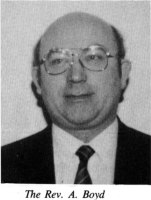 The
Rev. Alexander William Boyd, B.A., B.D., like two of his
predecessors, came from the Ballymena area. His father, Mr.
Nathaniel Boyd, was a farmer, and his son after his early education
at Carnaghts P.E. School and later the Ballymena Academy followed in
his father's footsteps, and proved himself to be a successful dairy
farmer. In spite of his prospects he responded to a strong
conviction that God was calling him into the Christian ministry. He
graduated B.A. (Hons.) from the New University, Coleraine, and
finally took his B.D. at Queen's University and his theological
course at Union College. He became assistant minister in Gardenmore
congregation, Larne, in 1982. He was licensed in his home
congregation of Wellington Street, Ballymena, in June 1983 and was
ordained in January 1984. He had married Miss Margaret McKillen, a
school teacher, of Ballymena, and had three children�Stephen,
Christine and Ian, all in their teens at the time he came to
Dromore. The
Rev. Alexander William Boyd, B.A., B.D., like two of his
predecessors, came from the Ballymena area. His father, Mr.
Nathaniel Boyd, was a farmer, and his son after his early education
at Carnaghts P.E. School and later the Ballymena Academy followed in
his father's footsteps, and proved himself to be a successful dairy
farmer. In spite of his prospects he responded to a strong
conviction that God was calling him into the Christian ministry. He
graduated B.A. (Hons.) from the New University, Coleraine, and
finally took his B.D. at Queen's University and his theological
course at Union College. He became assistant minister in Gardenmore
congregation, Larne, in 1982. He was licensed in his home
congregation of Wellington Street, Ballymena, in June 1983 and was
ordained in January 1984. He had married Miss Margaret McKillen, a
school teacher, of Ballymena, and had three children�Stephen,
Christine and Ian, all in their teens at the time he came to
Dromore.
Previously he had for a number of years been very
interested in Tear Fund and carried out a considerable programme of
deputation work on behalf of this Fund.
Having received an unanimous call to Banbridge
Road congregation he was installed on the 28th March 1985.
At the Installation the Charge was given by the
convener, the Rev. J. B. Irvine, of Hillsborough, who congratulated
him on receiving a Call to an absolutely harmonious congregation. At
the reception the Moderator of Presbytery, the Rev. Malcolm Scott,
welcolmed him, and the Clerk of Session, Mr. Jim Walker, said in his
welcome that all were looking forward to his coming and his
ministry. The Rev. Moore, the retired minister, in his welcome,
congratulated Mr. Boyd `on being called to a congregation like
Banbridge Road�they are a very kind, loyal, generous people.' He
wished him well. Others to offer congratulations, good wishes and
commendation, were the Rev. David Alderdice�his home minister, the
Very Rev. Victor Lynas, to whom he had been assistant, and the Very
Rev. John Carson, who had baptized him. Archdeacon William Neill,
Rector of Dromore Cathedral, (speaking on behalf of the other
churches) welcomed the new minister to the town.
In his reply the Rev. Boyd spoke of the many
blessings that had been his through his home, his church and his
assistantship. He spoke of his very vivid Call into the Ministry,
and said that in his work he would be giving priority to the sick,
the old and to visiting the people in their homes, and that his
preaching would be Bible based. He asked for their prayers.
Very soon he was involved in his pastoral
responsibilities, and the work of the organizations.The first major
task of a practical nature was the renewing of the windows of the
church hall, the original windows were now almost sixty years old
and the metal badly eroded. This was dealt with by the Property
Committee and the halls refurbished. The Moderator, the Rt. Rev.
William Fleming, D.D., dedicated the windows and commended the work
done at a special morning service on Sunday 20th September 1987. The
work had cost �7,000, three times the cost of the original hall.
Under the Rev. Boyd's leadership the congregation
continues to provide organizations for the young�Bible and Prayer
meetings and opportunities for social and recreational activity
through the Bowling and Badminton Clubs. The P.W.A. and Young
Women's Group cater for the ladies.
Early in Mr. Boyd's ministry the members of the
P.W.A. presented him with pulpit robes. The ceremony took place
after the evening service on Sunday, 19th September, 1985, Mrs. A.
Walker and Mrs. M. McCord carrying out the robing on behalf of the
Association. Good wishes were expressed to Mr. and Mrs. Boyd for a
continued happy and successful ministry.

An assistant minister was appointed for the first
time in the history of the congregation in the Spring of 1988. He
was Mr. Raymond Kelly from Dungannon. He had been a lecturer in
Dungannon College of Further Education. He decided that God was
calling him into the Christian ministry in 1984, and in preparation
he did a Queen's B.D. and entered Union College for his theological
course. He is married with two daughters. He was licensed on
Thursday, 3rd June, 1988, by the Presbytery of Tyrone; a number of
Banbridge Road members travelling to Dungannon for the occasion. For
the first months he travelled to Dungannon, but has now come to live
in Dromore. He is proving himself to be a very congenial young man
who gets on well with people and is a considerable asset to the
congregation.
THE SUNDAY EVENING
FELLOWSHIP
Early in his ministry the Rev. Boyd started a
Sunday Evening Youth Fellowship. At first it was held in the manse,
now it meets in the church hall Committee Room.
It has proved a valuable opportunity for young
people to meet for discussion and Bible Study. There is a varied
programme and those who attend are enthusiastic about the fellowship
they enjoy.

THE MORNING SUNDAY SCHOOL
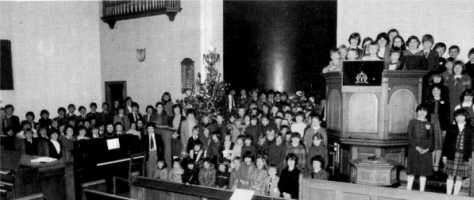
Morning Sunday School 1980
While there is no record of the date when a
Sunday School was commenced � it must have been quite early in the
ministry of the Rev. McKee as there are old Sunday School books
dating back to 1856. They were found underneath the original pulpit
when it was removed at the time of the 1953 renovation. They took
the form of reading books to teach children the alphabet, then
simple Bible words, and finally some short meaningful texts. The
Sunday School teacher in those days was first of all a teacher of
reading.
By the end of the century there were over 160
children attending Sunday School.
The first published list of names of Sunday
School teachers is to be found in the 1917 report. The earlier
reports were purely a list of subscriptions and a balance sheet. The
Sunday School teachers at that time were Miss Anna Hunter, Miss
Maggie McCracken, Miss Rachael McCracken, Mrs. McKee, Miss Jennie
Stirritt, John Graham, Thomas Johnston and Joshua Magowan.
There was an organ in the Sunday School 10 years
before there was a church organ. The organist, who was also
Secretary, was Miss I. Doak.
At this time the Rev. McMullan had just been
ordained and he made a great many changes. There was for the first
time a pastoral letter and considerable information in the report.
He commenced a minister's Bible Class, which was to continue for
almost 70 years.
Mr. Thomas Johnston was appointed a
Superintendent of the Sunday School in 1919 (previously the minister
had, it would seem, been superintendent). Thomas Johnston held this
office until his death in 1936. He had been a very faithful and
committed worker for the good of the Sunday School. His successor
was Robert J. Kerr, who held the office for the next nine years. On
his death William J. Thompson was appointed. He had been treasurer
for a number of years. His father, James Thompson, had assisted
Thomas Johnston for ten years. Apparently he had a gift of speech
and was highly respected for his good works and considerable
ability. He was tragically killed in an accident at the corner of
the Quilly Road. His son, William J., had many of his father's
qualities. He was greatly esteemed, he loved children, and worked
hard in the interests of the Sunday School until his resignation in
September 1972. He had been connected with the work of the School
for almost 50 years; 28 as superintendent. High tribute was paid to
him by his fellow elders.

John Wilkinson, who had been a senior class
teacher since 1956, was appointed superintendent. He was an
excellent organiser. This was also seen in his leadership in Life
Boys and work for the Saturday evening Youth Club.
When the hall was built in 1932, the Sunday
School was held there and a Primary Department was started by Mrs
Bole, the minister's wife, in the old hall at the back of the
church. There was a certain amount of opposition to it, in that it
was said it divided the Sunday School, and with its children's
chairs and other equipment, it was considered too `modern'. When Mrs
Bole left Miss M. Weir took over and remained in charge until she
was married to Sam Andrews. After this it was closed and all met in
the hall. After the Minor Hall was built a Primary Department was
mooted again. The hall was ideal and the right person was available
� Miss M. Patterson. She created a very well-organised department
and was in charge until 1967 when Miss Margaret Coulter took over.
To begin with she was known as the leader, but by 1982 she was
called the superintendent � the department having become more
independent.
The story of the Sunday School is a story on its
own. It is the story of dedicated leaders, faithful teachers, many
giving a lifetime of love to this work. The full results of the work
done in the Sunday School through those who gave of their time and
abilities will only be fully known in eternity.
After a few years John Wilkinson, preferring to
teach rather than to organise, took over the minister's Bible Class
and Eddie Lightbody was appointed Superintendent. A school teacher,
he gave valuable, if short service, and in 1986 Mrs Pamela Ferguson,
who had come from Larne to live in the town, was appointed.
It was the tradition of the Sunday School to
honour any teacher who had given long service. It was also customary
to present a gift to those who got married. While there were many
who received a gift for one or other of these reasons there were
several presentations for outstanding service. At the Annual Meeting
in March 1949, two ladies, Miss Archer and Miss Jane Stirritt, who
had been teaching for over forty years, were presented with gold
watches by the Sunday School. Many members of the congregation
joined in this recognition. The Sabbath School Society for Ireland
presented them with inscribed Bibles
William J. Thompson was the recipient of gifts on
two occasions. First, in 1964 when he had been superintendent of the
Sunday School for over 20 years. At that time he had been a member
of the Church Committee for 39 years and its secretary for 21. Such
services evoked the good will of the whole congregation.
On the occasion of the presentation the Rev.
Moore said that `Mr. Thompson has always given of his best. He has
at all times believed that in serving the Sunday School, he was
serving his Master to whom he seeks to win the children.' Mr. Cecil
Whan, the church treasurer, handed over a silver salver and tea
service.
In 1973 when he retired from the work of the
Sunday School he received the gift of an easy chair. There were many
expressions of good wishes.

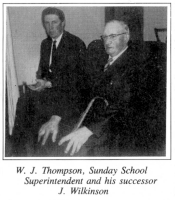 In
the autumn of 1947 the Session decided to approach the Session of
First Dromore about the possibility of starting a United Afternoon
Sunday School. It was left to Mr. Moore to discuss the matter with
the Rev. Andrew Thompson of First Dromore. It was felt there was a
genuine need at that time for such an opportunity for the girls and
boys of both congregations. The Sunday School was commenced in
January 1948. The demand for it and the attendance were beyond the
dreams of both congregations. It was held in Ban bridge Road Hall.
The superintendents were Robert Taylor (Banbridge Road) , and John
McGrehan (First Dromore) and there were nine teachers some from each
congregation. Cecil Whan was the secretary and treasurer. There were
initially over ninety on the roll. In
the autumn of 1947 the Session decided to approach the Session of
First Dromore about the possibility of starting a United Afternoon
Sunday School. It was left to Mr. Moore to discuss the matter with
the Rev. Andrew Thompson of First Dromore. It was felt there was a
genuine need at that time for such an opportunity for the girls and
boys of both congregations. The Sunday School was commenced in
January 1948. The demand for it and the attendance were beyond the
dreams of both congregations. It was held in Ban bridge Road Hall.
The superintendents were Robert Taylor (Banbridge Road) , and John
McGrehan (First Dromore) and there were nine teachers some from each
congregation. Cecil Whan was the secretary and treasurer. There were
initially over ninety on the roll.
In 1953 First Dromore decided that they would like to
have their own Afternoon Sunday School, and so it W. J. Thompson, Sunday
School was divided. The Banbridge Road Superintendent and his successor
School continued under Mr. Robert J. Wilkinson Taylor until 1961, when
Mr. Walter Smyth took over. Mr Smyth was a very dedicated promoter of
the Sunday School and with the support of the teachers always did his
best to maintain interest. In spite of all his efforts interest waned
and numbers fell. Mr. Smyth died in 1983 after 20 years of faithful
service. Mr. Cyril Latimer took over the struggling Sunday School and
managed with diligence to maintain the interest of the `few' until 1986
when it was closed. For almost 40 years it had played an important part
in the life of the congregation. The Carol Service was associated with
The Sunday School for many years; the girls and boys contributing items
and the offering going to its funds.
A congregation is always proud when one of its
members decides to enter the full time ministry of the church. Since
the beginning of the century four young men felt Called to devote
their lives to the service of God through the Christian ministry. A
short record of the life and influence of each is recorded as an
important aspect of the Banbridge Road Story.
The Rev. L. Rentoul, son of the second minister.
The Rev. A. L. R. Bickerstaff was born and
brought up in the congregation.
The Rev C. O. Weir whose forebearers were
foundation members of the congregation.
The Rev. David Latimer who grew up in the
ministry of the author.

REV. STEELE RENTOUL
The Rev. Rentoul's son Steele followed in his
father's footsteps and entered the ministry. He was born in Clough
and grew up in the Dromore manse. After school he went to the Royal
University of Ireland where he graduated in arts. He was licensed by
the Dromore Presbytery and was ordained in 1903 in Berwick-on-Tweed.
Later he became minister of Callon Presbyterian Church in Glasgow.
From there he moved to West Church, Houston, Renfrewshire. After a
ministry of 13 months, there he died in April 1933.
The qualities of the man can be judged from the
following extract from the memorial address, "He met life cheerfully
and bravely and was greatly respected for his strength of character.
People trusted and honoured him. He never forgot the dignity of his
calling. He was a faithful pastor, a welcome friend in the homes of
his people. He gave courtesy and he received it. He never said a
word unbecoming of a Christian and a gentleman."
He married a Dromore lady, the eldest daughter of
Mr. and Mrs. R. S. Edgar. Mr. Edgar had a large drapery business in
Dromore. Mr. Rentoul was survived by his wife and two sons.
It is interesting to note that his wife's
brother, John Hammond Edgar, M.S., Barrister-at-Law, a Lieutenant in
the Battalion Durham Light Infantry, was killed in action in France
on the 24th February 1916. There was a memorial service for him in
Banbridge Road Church on the 5th March. The address was given by the
Rev. James Rentoul and would seem to be the only sermon of the Rev.
Rentoul that has been preserved.
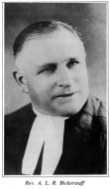 He
was born on the 4th February 1900 and brought up in the townland of
Tullyglush, Dromore. He went to the local school. After school days
he carried the post from Banbridge to Garvaghy. He tells how during
his boyhood days he was greatly influenced by the Rev. McMullan, his
minister, and that under his influence he began to study for the
ministry. Eventually he went as a student assistant to Belturbet and
Ballyconnell Presbyterian Churches in Co. Cavan. After a period
there he was sent by the Colonial Mission to Newfoundland where he
served the Canadian Presbyterian Church for some time. The climate
did not agree with his wife (She was a Miss Martha Little, daughter
of Mr. and Mrs. John J. Little of Poyntzpass) so he left
Newfoundland. He
was born on the 4th February 1900 and brought up in the townland of
Tullyglush, Dromore. He went to the local school. After school days
he carried the post from Banbridge to Garvaghy. He tells how during
his boyhood days he was greatly influenced by the Rev. McMullan, his
minister, and that under his influence he began to study for the
ministry. Eventually he went as a student assistant to Belturbet and
Ballyconnell Presbyterian Churches in Co. Cavan. After a period
there he was sent by the Colonial Mission to Newfoundland where he
served the Canadian Presbyterian Church for some time. The climate
did not agree with his wife (She was a Miss Martha Little, daughter
of Mr. and Mrs. John J. Little of Poyntzpass) so he left
Newfoundland.
He then accepted an invitation to serve in the
Presbyterian Church in England. After a course of special training
he was licensed by the Presbytery of Northumberland and subsequently
ordained. His first charge was at Widdrington and Broomhill,
Northumberland. Soon he moved to Bishop Auckland, Co Durham, where
he ministered from 1929 to 1932. From there he got a Call to Seaham
Harbour and was there for two years.
His next appointment was to Beucastle,
Northumberland, an extremely rural district. There he spent 14 of
his happiest years, he once said. Then he received a Call to North
Middleton and Babington. After five years there he moved to Norham
in June 1953. He stayed there until he retired in March 1971. He had
been Moderator of the Presbytery of Berwick. He kept a keen interest
in his home congregation of Banbridge Road, visiting it at least
once every year. The author is indebted to him for material and for
his memories of his home congregation.

REV. CECIL O. WEIR
Mr. Cecil Oliver Weir was ordained on the 24th
February 1938, the third young man in the congregation to enter the
ministry. As a boy he went to Backnamullagh and Drumlough Public
Elementary Schools and then to Lisburn Technical, from where he
matriculated to Magee College. At the end of his first year his
mother died and he transferred to Queen's where he graduated. As a
boy he took a deep interest in the scriptures and brought great
credit to himself and the Sunday School by winning three gold
medals. He was licensed on the 28th November 1937 and ordained in
First and Second Anaghlone on the 24th February 1938. Amongst those
who took part were his minister, the Rev. Herbert Mulholland, and a
former minister, the Rev. Thomas Bole, who at the time was Moderator
of the Dublin Presbytery.
At the reception his qualities and abilities were
commented on by a number of speakers who forecast a successful
ministry for him. From the point of view of this history most
interesting are his comments on the ministers under whom he grew up.
He said about the Rev. G. F. McQuitty � `I remember him chiefly for
his great work amongst the young in Sabbath School and Bible Class.'
The Rev Thomas Bole � `I remember him for his warm personal
friendship and the welcome one received at the manse.' `I remember
with special favour the late Rev. W. Bates. Under his influence I
not only dedicated my life to Jesus Christ but also dedicated myself
to the work of the ministry. I can say of the Rev. Bates he was a
Christian gentleman.' I also pay tribute to our present minister,
the Rev. Mulholland, from whom I have received many personal
kindnesses and often I have been helped by his quiet effective
evangelical preaching.' The influence of these ministers was a
blessing to young Mr. Cecil Weir and he in turn became a blessing to
many.
He married Miss Vivienne M. Todd in 1941. She was a
teacher and there were two children.
Much to the regret of the Anaghlone congregation
he left to go to Clare and was installed on the 5th July 1951. There
he was instrumental in building a new hall.
He was called to Donagheady on the 29th April
1965 and died on the 12th November 1967. It was a short but very
happy ministry. In the course of his ministry he published a book of
sermons, a history of First and Second Anaghlone and some children's
addresses. He was very musical, writing a number of Harvest Hymns
with music for the choir. He served the Church well and brought
credit to the congregation that nurtured him.
David Latimer was the fourth young man to enter the
Christian ministry from the Banbridge Road congregation and since he
was born into the congregation and grew up in it during the author's
ministry was the best known to him.
He is the son of Mr. and Mrs. Cyril Latimer. His
father is an elder in the congregation. He received his initial
education at Dromore Central Primary School and Banbridge Technical
College. After school days he was employed by the E.B.N.I. as it was
then called. He was successful with excellent prospects. He married
Miss Margaret Woods. He decided however that God was calling him
into the Christian ministry. He took up a course of study to qualify
himself for a Theological course and obtained a B.Sc (Econ) in 1978.
He gave up his job and entered Union Theological College, Belfast.
He obtained a Dip. Th. and was appointed student assistant to The
Very Rev. Dr. Howard Cromie in Railway Street, Lisburn. He was
licensed in his home church in June 1982 and ordained in Railway
Street in January 1983. In March 1984 he received a Call to Glascar
and Donaghmore, where he served the congregations well. Then in
March 1988 he received an unanimous call to First Derry and Monreagh
and was installed on 14th April.
His pleasant, affable, friendly personality and his
very real interest in people commend the Christian faith.

MISSIONS AND SPECIAL
SERVICES 1949-78
Like many of his predecessors the Rev. Moore
decided early in his ministry to have a series of special services.
He discussed this possibility with the Rev. Andrew Thompson of First
Dromore Presbyterian Church and it was decided to have a united
meeting of the Sessions. This was held in Banbridge Road on the 24th
January, 1949. At that meeting it was agreed to hold Evangelistic
Services from the 13th March to the 27th, the services to be
conducted by the Rev. John Thompson of Clarkston, Glasgow. It was
also arranged to hold a series of four preparation prayer meetings.
During the mission the Sunday evening services were held in First
Dromore and the week night services in Banbridge Road. Mr. Thompson
was known as the singing evangelist. His singing and preaching were
a blessing to many of those who attended.
During Mr. Moore's ministry there were a total of
seven missions which took various forms.
After he had been in the congregation almost nine
years in 1955, a mission under the title Dromore United Churches was
held. The title embraced the Church of Ireland, the Methodist and
the Presbyterian Churches. Since some of the denominations in the
town were not invited the title gave the wrong impression. There was
some `feeling' about the matter�an unfortunate start to services
designed to tell folk about the love of Jesus.
The ministers put a great deal of effort and
thought into the preparations. The evangelist was a Rev. Ivor P.
Sealey of Glasgow. A welcome meal, to which the ministers invited
the office bearers of the congregations involved, proved to be
valuable in putting the missioner and the office bearers at their
ease. The mission lasted two weeks. The Sunday evening services were
held in First Dromore, the week night services in Banbridge Road and
the morning Bible Studies and Lunch Hour services in the Cathedral.
These were taken by the ministers and the Children's Meetings were
held in the Methodist Church Hall. There were preparation services
as well as meetings for prayer. The preacher proved w be a fine
presenter of the Gospel and many testified to having been helped and
blessed through his ministry. It was agreed that the aims of the
Mission had been achieved: they were "The Glory of God, the
Deepening of Christian Life within the Church and the Awakening of
the Indifferent."
Out of this united effort there came the Sunday
Evening Epilogue Services when the same group of churches put on a
service after church. The whole service was conducted through the
medium of the screen and the ministers took it in turn to give the
short closing address. In the days before T.V. these drew very large
attendances.
In 1959 Commemoration Services were held to
celebrate the 1859 Revival. This was a united effort by First
Dromore and Banbridge Road churches. It took place in March and
lasted one week. There were two months of preparation services. The
mission itself was conducted by Dr. J. Edwin Orr and Rev. W. M.
Dunlap from the United States. Similar missions were held throughout
the Presbyterian Church at that time.
In April, 1962, Banbridge Road had a
congregational mission. The Rev. A. M. Park, who was at that time
minister of Orangefield, Belfast, conducted the services. He was
very much appreciated and much good work was done.
Seven years later a New Year Mission was
conducted by Mr. Michael P. Perrott, the General Secretary of the
Y.M.C.A., Belfast. His pleasant ways, his gifted presentation, and
his well illustrated addresses assured good attendances. After the
church service the Banbridge Road Youth Club held a Coffee Bar style
meeting. The hall was decorated like a barn; the young people
sitting on bales of hay. It proved very attractive, and very large
numbers of teenagers came and many were helped to understand the
meaning of faith in Jesus Christ. The various groups which sang each
evening were a great asset. There were two other evangelistic
efforts, `Come Alive in 75' and `Make '78 Great.' Both these
missions were conducted by the Rev. Harold Graham, who became very
popular with young and old in the congregation. His addresses were
to the point, challenging and up to date. He had a great raport with
the young people. Again, the hall was dressed as a barn and again
this attracted the young. A number of young people, especially young
boys, dedicated themselves to Jesus Christ and His way of life. The
second of these efforts suffered from bad weather, nevertheless good
work was done. The Rev. David Armstrong held children's meetings
each evening and the youth meetings were held in the hall; arranged
like a Pitstop on a car racing track. These were conducted by a
young minister, the Rev. John Woodside. He and the decor proved
attractive, but the weather and the time of the year affected the
enthusiasm. Again a number of young people were helped to see life
in the light of God's Love revealed in the life and death of His
Son.
Mr. Moore himself conducted a number of special
efforts linked with the morning service�one of the most effective
was `Flame' in 1974.
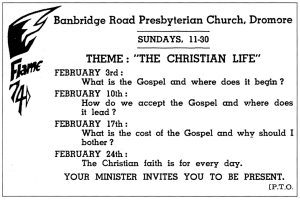

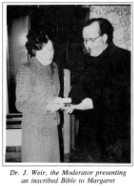 Records
show that from the beginning of the century there was in the
congregation a secretary for the Society. When the FWO system was
introduced at the beginning of 1927 a decision was made that the
collection for the Presbyterian Orphan Society should be kept
separate. About this time Miss Jane Stirrit was made secretary, an
office she held until 1954. W. J. Thompson was responsible for the
next 17 years. John Wilkinson held the office for a few years until
Miss Margaret Coulter, who had been a collector for the Society
since 1947, was appointed in 1979. Records
show that from the beginning of the century there was in the
congregation a secretary for the Society. When the FWO system was
introduced at the beginning of 1927 a decision was made that the
collection for the Presbyterian Orphan Society should be kept
separate. About this time Miss Jane Stirrit was made secretary, an
office she held until 1954. W. J. Thompson was responsible for the
next 17 years. John Wilkinson held the office for a few years until
Miss Margaret Coulter, who had been a collector for the Society
since 1947, was appointed in 1979.
When she had completed 25 years she was honoured by
the Sunday School, receiving a gold bangle. The Society paid tribute
to Margaret in 1977, when she had been collecting for 30 years. She
received an inscribed Bible, which was presented by Dr. J. A. Weir,
the Moderator. In 1983 Miss Coulter was made a Life Member. Any
honour she received she said belonged to all who had helped and
supported her over so many years.
LET THE PEOPLE SING
CHOIR, ORGANISTS AND PRAISE
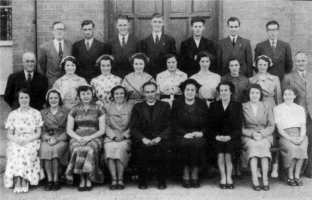
The Choir 1953
In its early days, the congregation, like most
Presbyterian. Churches, used the metrical Psalms in the praise of
God. There was of course no organ. The earliest report reveals that
a Precentor, with his tuning fork, was paid �6 a year for leading
the praise and I suppose training the choir. This was increased to
�10 by the turn of the century. There is no record of the name of
The Precentor until the report of 1917 when James McCormick (still
�10 a year) is indicated as responsible for the choir. The following
notice appeared under his name in the Church Report.
"A Choir Practice is held each Tuesday evening,
and a Junior Choral Class each Friday evening during the winter
months. All who are interested in the praise part of our services
are invited to attend, so that this portion of our worship may be
strengthened and brightened."

While this is the first indication of choir
practices, concerts that were run annually by the Sabbath School
Entertainment Committee indicated a lot of hard work and enthusiasm
by the choirs. For instance, in 1915 a Patriotic Concert was held in
the church, the Junior Choir contributing four items and the Senior
Choir six, many of them quite demanding pieces � altogether a
programme of 25 items starting at 8 p.m.! James McCormick apparently
was the moving spirit in this and other similar occasions. He
remained precentor until the first organist was appointed in late
1929.
Miss May Kerr was appointed and commenced her
duties at the beginning of 1930. James McCormick continued as
choirmaster for a number of years, giving back part of his salary to
help pay for the organist. He had a great love for music and in 1954
it was he who presented the pipe organ in memory of his daughter who
died in childhood.
Miss Kerr was organist until 1935 when Earl
McCracken was appointed. The Rev. Mulholland said about the choir
and young organist in his report at the Congregational Meeting in
March 1936. "We thank the choir and organist for their splendid
conduct of the praise. At all times they are most loyal and their
invaluable work is appreciated by all".
Over many years and under different organists,
the choir who led the praise, received the approbation of the
ministers and the worshippers. After seven years Earl McCracken
resigned and Miss Minnie Ellison was appointed. She was at the time
a member of First Dromore and her brother William agreed to come
with her and train the choir; another brother John became a member
of the choir to help in the bass section. These were members of
First Dromore Choir. The ministers of the two congregations agreed
to this appointment and it was made in good will. Apparently not
everyone saw it that way at the time and this is understandable.
Miss Ellison gathered round her a very faithful choir membership.
During her 10 years as organist the choir gave her loyal support.
When the pipe organ was installed at the time of
the renovation she was offered the position of organist but
declined. Donald McDonald Smyth was appointed in May 1954 in
preparation for the opening services in November. Mr. Leonard E.
Bartram of Dublin, who designed and built the organ for Messrs.
Peter Conacher and Company Ltd., and who was an outstanding
organist, was asked to give an organ recital on the Friday evening
prior to the opening services of dedication. He also presided at the
organ on the Sunday. Miss Joan Pollock of Dublin was the soloist.
Donald Smyth took over the following Sunday. He is remembered not
only for his musical ability but perhaps especially in people's
memories as the organist who insisted that the congregation should
stand for the first chord of the music when the hymn had been
announced � this has been so ever since. He resigned in the early
summer of 1955 and a young organist, Stanley Woods, was appointed.
He established a good relationship with the choir and when he left
in June 1958 there were many who were genuinely sorry. Miss Margaret
E. McCracken, the sister of Earl, was appointed and took up duties
in September and gave valuable service for the next 13 years,
resigning at the end of 1971. Cecil Caughey took over on the first
of January 1972. He was popular with the choir and people, but owing
to bad health he was forced to relinquish his post. The Session
found it difficult to find a suitable successor and Miss McCracken
was approached and asked to take over on a temporary basis. She
consented and the `temporary' was almost `permanent' for it
continued for two and a half years. From time to time she had the
help of Mrs. Elizabeth McDonald. Towards the end of 1975 Jackie
Stewart was appointed and commenced his duties as organist on the
first Sunday in 1976. This proved to be a very popular appointment
and the choir gave him their full-hearted support. At this time Mr.
and Mrs. Herbie McDonald took on the responsibility of training the
choir in co-operation with Jackie. This proved to be a great team.
When Jackie Stewart asked to be relieved of the evening services,
Mrs. McDonald became responsible for them and over the years they
have worked together in a most harmonious spirit. At the time of
writing Jackie, Elizabeth and Herbie are still playing their part in
the worship of God through Psalm, Hymn and music. In January 1973
hymn books were needed. It was decided by the Session to wait until
June, when the Third Edition would be available. While for a period
both hymn books were used, the choir was anxious to get using the
fine new hymns. From time to time they sang one as an anthem to
prepare the congregation for the full use of the hymnary. Over a
period of years many of the hymns came into use and the children
enjoyed the large number provided for them. It was generally agreed
that while the revised hymnary was a valuable aid to worship and a
considerable improvement it was a pity that more new hymns had not
been included.
Herbie McDonald joined the choir in 1945 and has
remained a loyal member for over forty years now. He was elected to
the church committee in 1965 and ordained an elder in 1970. He also
taught in the morning Sunday School for many years.
Praise has always had an important place in the
worship of God. Banbridge Road was no exception, and the choir, and
organists of the congregation justifiably claimed that they always
gave of their best.
"We will sing and praise Thy power" (Ps. 21 V.
13).

MEETINGS FOR PRAYER AND
BIBLE STUDY
The first record of meetings being held
specifically for prayer is found in the 1917 report. It indicates
that a pre Sunday morning service meeting was held to ask God's
Blessing on the services of the day. This was promoted by the
minister, the Rev. McMullan, and continued each Sunday for forty
years. It was discontinued in 1956, although for a number of years
some of the Sunday School teachers met for prayer between the Sunday
School and the service. The Sunday morning meeting for prayer has
been reintroduced in recent years.
During the Rev. McQuitty's ministry about 1922, a
mid-week meeting was commenced. Later in his ministry it became
associated with the Christian Endeavour when a branch was formed
embracing First Dromore, the Methodist and Banbridge Raod
congregations. This united meeting continued to he an opportunity
for prayer and Bible study well into the fifties. The Rev. McQuitty
started a Men's Meeting for prayer on Friday evenings and It was
supported for a number of years. Also introduced at this time was
the District Meeting for prayer. These meetings were held at
irregular intervals until the outbreak of the Second World War in
1939. After the Rev. Moore came in 1946, the Christian Endeavour
meetings continued for some years, as did the pre morning service
meeting for prayer.
In September 1950 the Kirk Session received a
letter requesting a weekly congregational meeting for prayer. The
request was discussed at some length and and it was felt in view of
the weekly Christian Endeavour meeting that a decision should be
left until a later date. In November it was decided not to do
anything to upset the existing arrangement. This matter was again
raised in October 1952 and this time it was agreed that a meeting
for prayer and Bible Study should be held during the winter months
starting in November. Initially it was held in the church and was
well supported often reaching the fifty mark. As the years passed
the attendances dwindled and twenty five to thirty became the
pattern. When the Minor Hall was built the meetings were held there
and later in the hall Committee Room. Although attendances became
smaller it was always a very useful meeting � subjects and topics
being dealt with as well as Bible Study and time for prayer.
There were also special times of prayer before
missions.
When the Rev. A. Boyd came a second weekly meeting
for Bible Study was commenced.
THE INTERNATIONAL BIBLE
READING ASSOCIATION
The long and faithful service of the secretaries
of the I.B.R.A. is worthy of record.
The opportunity to obtain Bible Reading notes was
introduced in 1934. At the time Miss Emily Black was the treasurer
of the Minister's Bible Class and she was appointed secretary. She
remained secretary until her marriage to William Thompson in 1938.
Miss Amelia McCready took over the responsibility and held the post
until her marriage in 1947. She was succeeded by her sister Winnie
who also held the post until her marriage in 1955. Miss May Wilson
was asked to take on the secretaryship, a task, which she, like her
predecessors carried out efficiently � Miss Wilson is now in her
thirty third year as secretary and must be congratulated on her very
long period of faithful service to the congregation through her work
for the I.B.R.A.

|